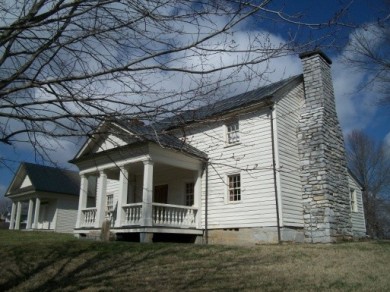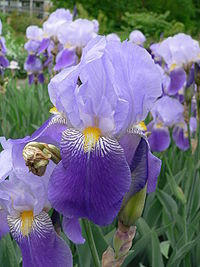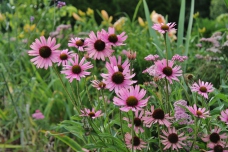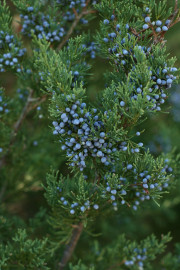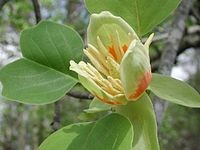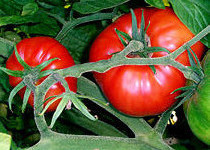Tipton-Haynes State Historic Site
Tipton-Haynes Historic Site is situated in a beautiful mountain valley of Eastern Tennessee and has been described as Tennessee’s most historic location. Early Woodland Indians and later the Cherokees established hunting camps on what is now Tipton-Haynes Historic Site. It was the home to statesmen from the American Revolution through the Civil War. French botanist Andre Michaux documented native plants during several visits to the site.
At Tipton-Haynes State Historic Site, Master Gardeners maintain several gardens: wildflower/butterfly/pollinator gardens, a small kitchen garden, and what is called the slave garden.
In the front Nature/Pollinator gardens, our focus is variety and visual appeal for visitors to the site, AND for butterflies, bees, and other pollinators. Having been designated a Certified Monarch Waystation in 2014 we emphasize native plants and those that attract and/or serve as hosts for Monarchs and other caterpillars.
The Nature/Pollinator gardens contain many plant varieties, including anise hyssop, aromatic aster, native columbine, purple coneflower, orange coneflower, common milkweed, butterfly weed, 2 varieties of swamp milkweed, common milkweed, aster, downy skullcap, great blue lobelia, Virginia Bluebell, huskers red penstemon, anise sage, passion flower, black-eyed susan, pipe vine, and prairie coreopsis (to name a few). These plants provide a succession of blooms through the growing season that provide nectar for butterflies and hummingbirds and food for caterpillars. We also have several native azaleas, oakleaf hydrangea, summer sweet (clethra), bloodroot, and ostrich ferns along the walkway.
In addition to those native varieties, we also plant zinnias and cosmos to provide additional nectar throughout the summer for emerging new butterflies as well as for visiting butterflies.
We began documenting the types and number of caterpillars in 2015. In the last few summers we noted successful hosting of 100+ Monarch caterpillers, plus Black Swallowtail caterpillers, Gulf Fritillary caterpillers, and numerous Pipevine Swallowtail caterpillers. We also spotted close to 4 dozen Monarch chrysalises.
The vegetable gardens at Tipton/Haynes consist of two small plots in the historical area. The Kitchen Garden is representative of a small garden near the house that would have grown those vegetables that need a little extra care and be handy for meal preparation. We emphasize heirloom varieties where we can, using varieties grown in Thomas Jefferson’s Monticello gardens. Colonel Tipton knew and corresponded with Jefferson, so we infer that maybe they exchanged gardening information.
We have some perennial plants: strawberries and rhubarb, along with herbs: sage, oregano, lavender, and rosemary. Garlic is planted in the fall around the edges. In spring we plant broccoli and cabbage, onions, carrots, beets, lettuce, spinach, and chard. As it warms up, we add Heirloom tomatoes, peppers, and Scarlet runner beans. We also add some of the annual herbs.
The Slave Garden, as it is called, is located behind the restored slave cabin, home to George, the Haynes family’s slave. It was usual for slaves to have a small garden to provide some of their own food.
Historical information is scarce so we choose to plant vegetables that originated in Africa, such as okra, field peas, peanuts and watermelon, plus some New World plants that George might have adopted: potatoes and squash.
This garden is fenced in a wattle style, using branches and tree trimmings, such as George might have used to keep out the wildlife.
Our emphasis in the kitchen and slave gardens is to display for the education of visitors to the historical site; we don’t try to maximize production. We do produce quite a bit of food, though, which we share with the staff, but mostly we just have a good time.
In 2021 we were presented with a new opportunity! A new parking lot and median meant a new place to plant! Tipton-Haynes installed split rail fence around the median. We planted Winterberry, Holly, Coralberry, Beauty Berry, Mountain Mint, Amsonia, and Goldenrod, as well as coneflower, creeping phlox, butterfly weed, passion flower, little bluestem grass, hyssop, blackberry lily, and husker's red penstemon. We added a large native wildflower area meant to greet visitors as they entered the site, and continue to plant perennial plants at the top of the area. The new area is growing and flourishing!
In 2023 we improved a shady area to make it more welcoming to visitors by improving the soil, then planting coral bells, hostas, and Green and Gold ground cover.
We welcome any Master Gardeners who are looking for a place to share fun and earn volunteer hours, please contact us! We typically work on Thursday, but are flexible if YOU want to help on another day.
Contact: Vern at vjornmaddux@embarqmail.com or Betts at BettsL@aol.com

